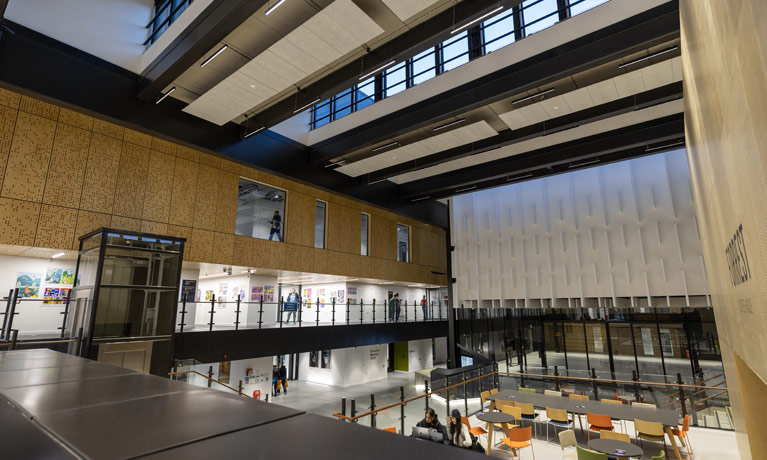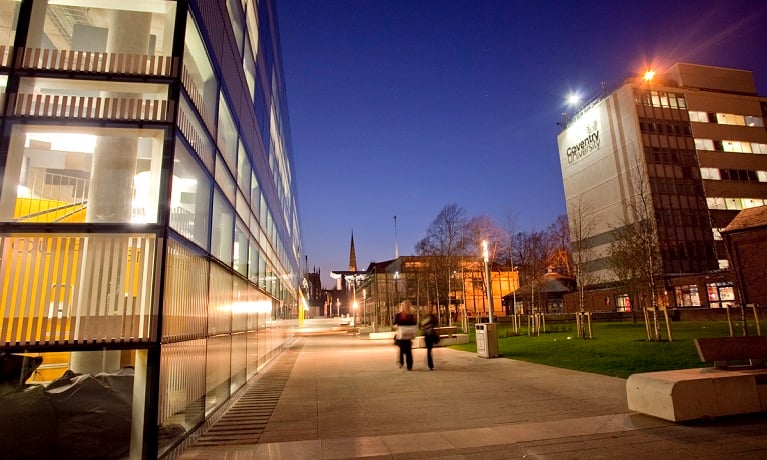Search
Sociology and Social Research MA
Study level: Postgraduate
In a world of rapid and disruptive social change and pressing social problems, our Sociology and Social Research MA provides intellectual and practical tools to navigate its challenges and opportunities.
Year of entry
2024-25
Location
Coventry University (Coventry)
Study mode
Full-time
Part-time
Sandwich
Duration
1 year full-time
2 years part-time
2 years part-time (with professional experience)
Course code
AHT079
Start date
September 2024
January 2025
May 2025
The information on this page is for 2023-24 entry and should be used as guidance for 2024-25 entry. Please keep checking back on this course page to see our latest updates.
Course overview
This course is designed for students who aspire to be change-makers in the world around them. It provides an opportunity to interrogate the scope and scale of contemporary social issues and transformative social changes.
- Research-enhanced and practice-focused tuition from subject specialists in gender, sexualities, race and ethnicities, social protest, media and contemporary cultures, disabilities, crime and criminal justice.
- Advanced training in social research methods in an active and inclusive community of researchers, some of whom have practitioner experience in their field of expertise.
- You will have the option to apply for a ‘professional experience’ opportunity2, designed to further develop your skills and knowledge with the aim of maximising your employability prospects. See the 'What you'll study' section for more information.
Rated Gold Overall
Teaching Excellence Framework (TEF) 20235 QS Stars for Teaching and Facilities
QS Stars University RatingsTop 5 Student City in England (Coventry)
QS Best Student Cities Index 2025Why you should study this course
- You'll explore natural and anthropogenic catastrophic risks such as climate change, pandemics, terrorism and violence, global population growth and economic recession. This includes socio-economic and political challenges such as the rise of polarising populism, punitive responses to crime and disorder and persistent social injustice linked to legacies of colonialism and widening wealth and generational inequalities. Individual and cultural responses to change including the clash of identity politics in a digitised cultural landscape and the emotional and cultural disruptions wrought by fluid bodies, sexualities and genders occupying real-world and virtual spaces and situations complete these studies of the social complex.
- A key aim of this flexible programme is to equip you with knowledge and skills that are valuable for entering the graduate job market.
- There is a focus on community engagement and developing networks in the public, private, charitable and voluntary sectors, which emphasises collaboration and co-creation in an inclusive learning community. You will gain an understanding of how far academic ideas and research can travel and transform in social, political, cultural and professional contexts – especially in the form of evidence-based policy and practice.
- The course is situated in the School of Humanities which has a strong portfolio of academic research. Course delivery is by a team of experienced, active researchers, with a range of expertise in social science, who offer distinctive, research-informed and innovative teaching, including researchers engaged in impactful projects on diversity, equality and identities (staff are subject to change).
Collaborations with other organisations
Confucius Institute
The School of Humanities is home to the Confucius Institute. This is a collaboration created with Jiangxi University of Finance and Economics, which aims to promote an understanding of the Chinese language and culture.
What you'll study
You’ll explore social change and social problems on local and international scales; from terrorism and violence to social injustice, the commodification of intimacy and more.
With professional experience option
The professional experience opportunity2 enables you the opportunity to apply for optional professional experience in semester 1, which, upon successfully securing an opportunity, will extend the duration of your master’s to either 16, 20 or 24 months. The professional experience provides an opportunity for you to develop expertise and experience in your chosen field with the aim of enhancing your employability. The professional experience supports the development of students’ personal and professional skills, such as communication, team-working, self-management, project working and critical reflection to enhance their future employability. This experience will build up on students’ previous learning and experiences and encourage them to reflect on their work and skill sets prior to undertaking the final sixty credits of M level study.
Please note that the optional professional experience modules incur an additional tuition fee, which for 1 semester of professional experience is £1,333.33, for 2 semesters of professional experience is £2,666.67, and for 3 semesters of professional experience is £4,000.
Professional experience may also be subject to additional costs, visa requirements being met, subject to availability and/or competitive application. Professional experience opportunities are not guaranteed but you will benefit from the support of our Talent Team in trying to find and secure an opportunity. Find out more about the professional experience option.
We regularly review our course content, to make it relevant and current for the benefit of our students. For these reasons, course modules may be updated.
How you'll learn
The course aspires to create a flexible and personalised learning journey which will take advantage of opportunities for hybrid delivery. Teaching and learning methods may include campus-based and online lectures, seminars, workshops and one-to-one supervision on student projects.
There will also be opportunities for experiential learning2 and for group and collaborative work as well as self-directed study and supervised research. Digital technologies will be used to innovate course delivery such as using immersive learning technologies and virtual teaching spaces4.
This course can be offered on a part-time basis. Whilst we would like to give you all the information about our part-time offering here, it is tailored for each course each year depending on the number of part-time applicants. Therefore, the part-time teaching arrangements vary. Request further information about part-time study.
Teaching contact hours
The number of full-time contact hours may vary from semester to semester, however, on average, it is likely to be around 10 contact hours per week in the first two semesters.
Additionally, you will be expected to undertake significant self-directed study of approximately 35 hours each week, depending on the demands of individual modules.
The contact hours may be made up of a combination of face-to-face teaching, individual and group tutorials, and online classes and tutorials.
As an innovative and enterprising institution, the university may seek to utilise emerging technologies within the student experience. For all courses (whether on-campus, blended, or distance learning), the university may deliver certain contact hours and assessments via online technologies and methods.
Since COVID-19, we have delivered our courses in a variety of forms, in line with public authority guidance, decisions, or orders and we will continue to adapt our delivery as appropriate. Whether on campus or online, our key priority is staff and student safety.
Assessment
This course will be assessed using a variety of methods which will vary depending on the module.
Assessment methods may include:
- Group work
- Presentations
- Reports
- Projects
- Coursework
- Individual Assignments
- Roadmaps
The Coventry University Group assessment strategy ensures that our courses are fairly assessed and allows us to monitor student progression towards achieving the intended learning outcomes.
Entry requirements
Fees and funding
2024/25 tuition fees.
| Student | Full-time | Part-time |
|---|---|---|
| UK, Ireland*, Channel Islands or Isle of Man | £9,350 | £13,350 (with professional experience) | Request fee information |
| EU | £9,350 | £13,350 (with professional experience) per year with EU Support Bursary** £16,700 | £20,700 (with professional experience) per year without EU Support Bursary** |
Not available |
| International | £16,700 | £20,700 (with professional experience) | Not available |
For advice and guidance on tuition fees3 and student loans visit our Postgraduate Finance page.
We offer a range of international scholarships to students all over the world. For more information, visit our International Scholarships page.
Tuition fees3 cover the cost of your teaching, assessments, facilities and support services. There may be additional costs not covered by this fee such as accommodation and living costs, recommended reading books, stationery, printing and re-assessments should you need them.
The following are additional costs not included in the tuition fees:
- Any optional overseas field trips or visits: £400+ per trip.
- Any costs associated with securing, attending or completing a placement (whether in the UK or abroad).
*Irish student fees
The rights of Irish residents to study in the UK are preserved under the Common Travel Area arrangement. If you are an Irish student and meet the residency criteria, you can study in England, pay the same level of tuition fees as English students and utilise the Tuition Fee Loan.
**EU Support Bursary
Following the UK's exit from the European Union, we are offering financial support to all eligible EU students who wish to study an undergraduate or a postgraduate degree with us full-time. This bursary will be used to offset the cost of your tuition fees to bring them in line with that of UK students. Students studying a degree with a foundation year with us are not eligible for the bursary.
Facilities
You will benefit from studying on our well-equipped, modern campus. Our aim is to offer you sector-leading facilities in a dedicated environment4.

Delia Derbyshire Building
The Delia Derbyshire complex offers more space to learn, design and make, including a hyper-studio for students across all disciplines to collaborate on projects together, a gallery space and an events atrium.

The Library
You will benefit from our support designed to help you succeed and our industry-relevant teaching and resources. These include our modern library and computing facilities, dedicated careers advice and Your Students’ Union.

George Eliot building
Named after one of the leading writers of the Victorian age, the George Eliot building is the city centre home of English studies at Coventry University. Mingle with like minded students, cross the Edible Garden campus to relax at the Hub, or take the few minutes walk to immerse yourself in books at the Lanchester library.
Careers and opportunities
Upon successful completion of this course, you should have:
- an advanced and distinctive skill-set that can be applied in social contexts including the workplace. For example, the development of social research skills is emphasised through the opportunities given to create a digital ethnography, and through the programme’s core research training modules and final research project. Such social research skills - especially when embedded in a decolonised curriculum which does not privilege the research traditions of the Global North - have the benefit of being transferable to a number of national social contexts, both national and international
- an all-important digital fluency – for example, through the production of digital portfolios4
- benefitted from opportunities to develop skills in leadership, strategic thinking, planning and problem-solving
- developed resilience in the face of major social problems, be able to rise to their challenge and to enhance your communication skills to creatively disseminate knowledge to a variety of audiences
- recognition of the importance of co-creation and embraced the opportunity to become stakeholders in course development and delivery. Creativity and enterprise will be modelled by staff who deliver modules and innovate new ways of teaching and learning.
The Sociology and Social Research MA prepares you for further postgraduate study, as well as entry into a variety of careers. This MA also readies you for the wider world of work in a culturally diverse global marketplace; highly transferable and timely skills enable graduates to capitalise on a job market increasingly defined by flexibility and sociological concerns.
Graduate Immigration Route visa
Based on current information from the UK Government, international students whose study extends beyond summer 2021 may be eligible for a visa under the UK Government’s Graduate Immigration Route, which will enable students to stay and work, or look for work, in the UK at any skill level for up to two (2) years. Check the most up to date guidance available to check your eligibility and any updates from the UK Government before making an application or enrolment decision.



